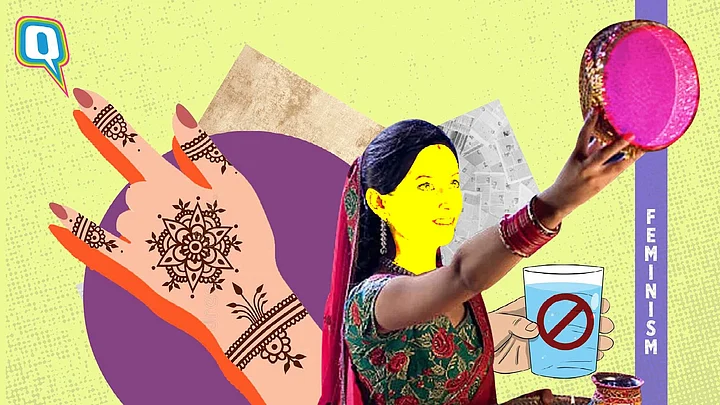A mix of feminist discourse and technology has forced Indian traditions to evolve and break loose of their rigid rules. This has given us Hindu weddings that exclude vidais, prayers that are done over Zoom, and festivities that are exchanged on WhatsApp.
Karva Chauth is not exempt from these changes, which are discussed in online articles every year, and the pieces usually fall into one of five categories. Check them out here.
1. The Traditionalist Piece
This is a simple rehash of the standard Karva Chauth piece platforms put out every year. It will contain a basic introduction to the festival and its historical origins. It will delve into the various regional practices that have evolved around the festival over time. Under the guise of neutrality, it will tacitly normalise the practice. It might even embed a countdown to the moon sighting on a corner of the web page. In the comments section, there will be more men badmouthing feminists in anticipation of critique than actual feminists critiquing the damn thing.
2. The Feminist Rebuttal
Right on cue, a feminist rebuttal will arrive on our digital doorsteps. This piece will quite rightly point out the problematic nature of the festival. It will systematically expose the nexus of capitalism and brahminical patriarchy that keeps this outdated practice not just afloat but thriving in this day and age. It will be dripping with barely restrained rage, awash in satirical derision. It will be published most likely on a popular listicle website, right alongside pieces titled 'Ten Henna AF Tattoos You HAVE to See from Around the Country Today' and 'Fifteen Different Kind of Decorative Sieves Available at a Steal from Amazon RN, Guys'.
3. The Rebuttal to the Rebuttal
To finish the circlejerk, a right-wing outlet will publish a counter-attack to the above piece. It will recuperate a progressive history of the festival and project it as a brave attempt to shore up national soft power in the face of eroding traditional values. It will bury the reader in science-based justification for why fasting is uniquely beneficial for women. Bonus points if the author is a woman.
4. The Woke Husband’s Op-Ed
This will be a personal essay written by a man who identifies as a feminist. It will perform a deep dive into the author’s childhood that was shaped by strong female figures; the strong female figures in question will be the author’s mother who worked as a journalist/university professor but maintained a spotlessly clean and efficiently run household and a distant aunt who divorced her no-good husband despite familial opposition.
The piece will wax eloquent about the perseverance of women, their iron constitution, and their seemingly otherworldly ability to multitask. It will give us beguilingly intimate glimpses of the author’s home life and the ways in which romance is sustained in a progressive way that flies in the face of antiquated gender roles. This is why, the author will say, he is fasting right alongside his wife. The piece will fail to mention the said wife’s name or job or any other detail that might help the reader imagine her personhood.
5. The Meta Critique
This piece will perhaps be the most irritating of them all. It will presume to give the reader a summary of all possible perspectives on a controversial cultural and religious practice but do it in an ironically reductive way. It will masquerade as clever postmodern commentary on the culture of endless content generation while generating yet more content. No matter
how many retweets and likes it gets on social media platforms, it won’t quite fill the void deep inside its writer where the joy of sincerity and conviction used to be.
Which one did you read today?
(Neha Yadav is an writer and academic based in Goa. She writes about gender, literature, and films. Her stories have appeared in Scroll, The Wire, Agents of Ishq, and Strange Horizons).
(At The Quint, we question everything. Play an active role in shaping our journalism by becoming a member today.)
